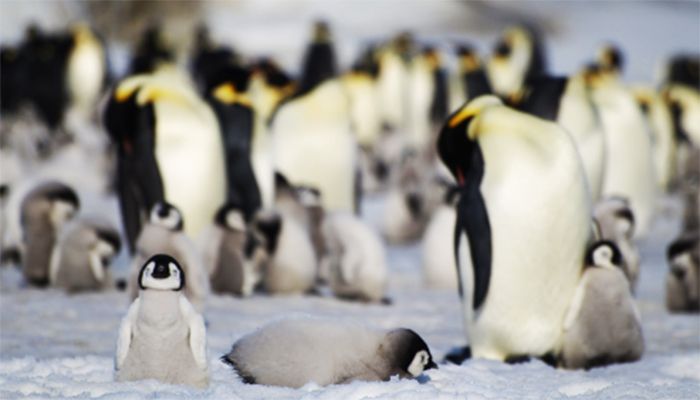
International Desk
Publish: 25 Aug 2023, 12:02 pm

Photo: Collected
Around 10,000 emperor penguins drowned in late 2022 as a consequence of sea ice under the chicks melting and collapsing as a result of climate change before they could develop the water-resistant feathers needed to swim in the Antarctic ocean.
Last year, the occurrence was photographed by satellites in an area near the Bellingshausen Sea in the west of the continent.
According to the BBC, the melting of the continent's seasonal sea ice as a result of global warming is anticipated to result in the extinction of over 90% of emperor penguin colonies by the end of the century.
The complete demise of those four colonies is described in a paper published on Thursday (24 August) in the journal Communications Earth & Environment.
After completing that research, lead author Peter Fretwell of the British Antarctic Survey (BAS) said he examined satellite images of the remainder of the continent's 66 known emperor penguin colonies.
In 19 of them — nearly 30% — most if not all of the chicks are believed to have drowned or frozen to death when the ice that once supported them melted into the sea, he said.
"Emperors depend on sea-ice for their breeding cycle; it's the stable platform they use to bring up their young. But if that ice is not as extensive as it should be or breaks up faster, these birds are in trouble," he added.
"There is hope: we can cut our carbon emissions that are causing the warming. But if we don't we will drive these iconic, beautiful birds to the verge of extinction."
The scientists tracked five colonies in the Bellingshausen Sea sector - at Rothschild Island, Verdi Inlet, Smyley Island, Bryan Peninsula and Pfrogner Point.
Using the EU's Sentinel-2 satellites, they were able to observe the penguins' activity from the excrement, or guano, they left on the white sea-ice. This brown staining is visible even from space.
Adult birds jump out onto the sea-ice around March as the Southern Hemisphere winter approaches. They court, copulate, lay eggs, brood those eggs, and then feed their nestlings through the following months until it's time for the young to make their own way in the world.
This normally occurs around December/January time, when the new birds head out into the ocean.
But the research team watched as sea-ice under emperor rookeries fragmented in November, before thousands of chicks had had time to fledge the slick feathers needed for swimming.
Four of the colonies suffered total breeding failure as a result. Only the most northerly site, at Rothschild Island, had some success.
Antarctic summer sea-ice has been on a sharp downturn since 2016, with the total area of frozen water around the continent diminishing to new record lows.
The two absolute lowest years have occurred in the past two summer seasons, in 2021/22 and in 2022/23, when the Bellingshausen was almost completely devoid of ice cover.
What is more, the slowness of floes to form in recent months means the colonies will probably not be producing chicks for at least another year.
Winter maximum sea-ice extent, normally reached in September, will track far below where it would normally be.
In the Arctic, the sea-ice has been in a decades-long, steady decline. The Antarctic in contrast seemed more robust. Up until 2016, it was becoming slightly more extensive year on year.
Studies in the Arctic have indicated that if we could find a way to stop global warming, the arctic north's sea ice would reappear. We don't know if it would be true in the Antarctic. But there's every reason to believe that the sea ice would regenerate if it got cold enough, according to Dr. Caroline Holmes, a BAS colleague and an expert on Antarctic sea ice.
Emperors are now listed as "Near Threatened" by the International Union for Conservation of Nature (IUCN), which compiles the lists of the planet's most endangered species.
Because of the threat that climate change poses to the emperors' way of life, it has been suggested that they be moved up into the more urgent "Vulnerable" category.
Source: BBC
Subscribe Shampratik Deshkal Youtube Channel
© 2024 Shampratik Deshkal All Rights Reserved. Design & Developed By Root Soft Bangladesh